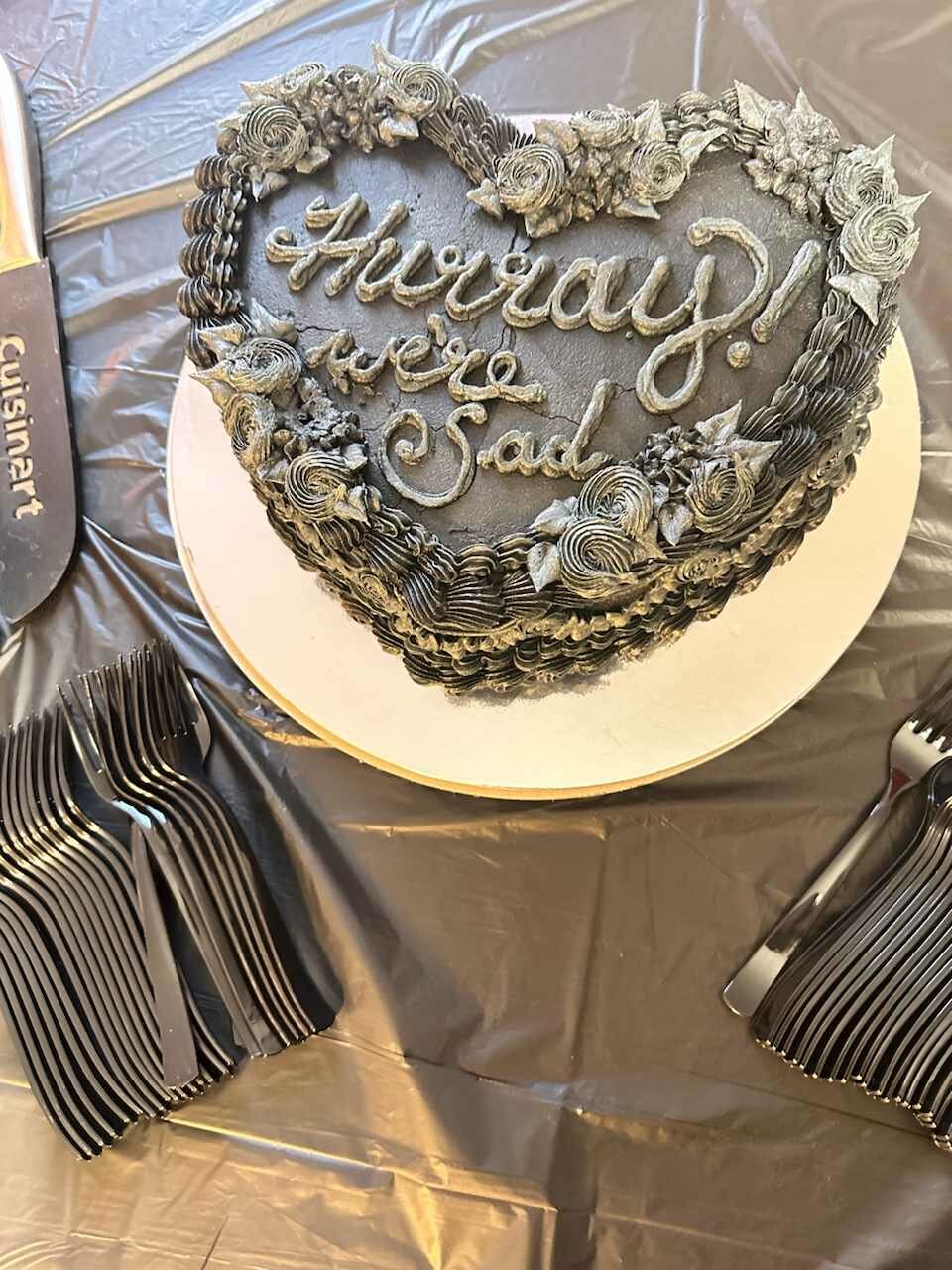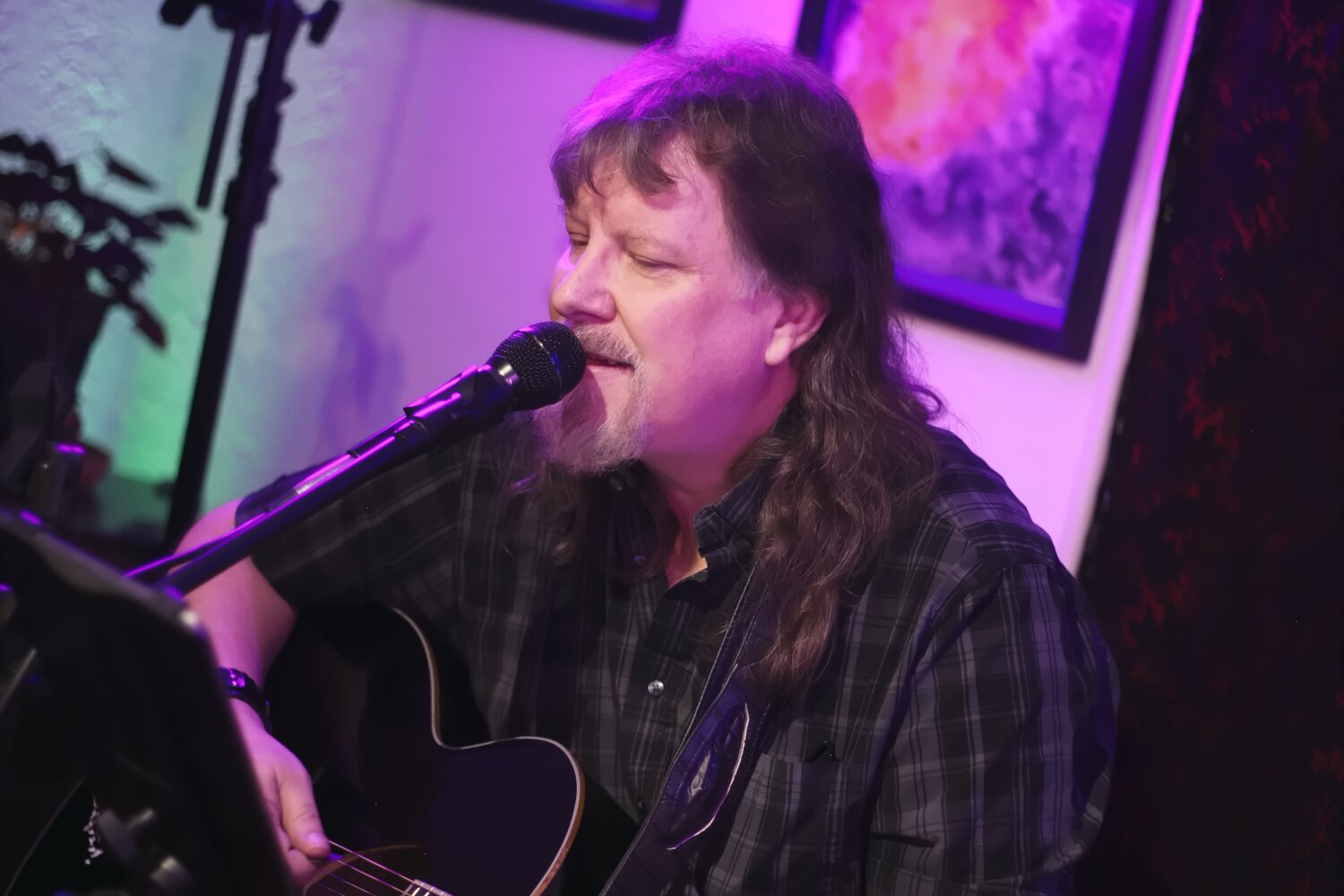Wind: mph,
Welcome to our new web site!
To give our readers a chance to experience all that our new website has to offer, we have made all content freely avaiable, through October 1, 2018.
During this time, print and digital subscribers will not need to log in to view our stories or e-editions.
This story includes mentions of suicide. If you or someone you know needs help, the national suicide and crisis lifeline in the U.S. is available by calling or texting 988. There is also an online chat at 988lifeline.org.
More than two dozen people gathered in a local art gallery. They performed – and listened to – music and poetry. And they enjoyed cake by a local baker.
On the surface, it might have seemed like a typical party. But if you’d stayed around for any length of time, you’d have seen it was a gathering of an unusual kind.
Featuring a lineup of local poets and musicians, the event was part performance and part therapeutic outlet, all revolving around the public expression – and acceptance – of people’s grief.
Indeed, it was the area’s first “grief party.”
“It was musicians and poets who performed, and they all had a grief to share,” said lead organizer Liz Liano, a local poet and mental health advocate. “Some had familial loss; some had difficult caregiving situations. My own grief I detailed was that my brother recently went back to prison. That’s been pretty tough. This is how I process that kind of thing. I have a bunch of poems I've written about it.”
The party, promoted by the Las Cruces Suicide Prevention Task Force, was the first of what organizers hope will become a regular occurrence, offering artists and members of the broader Las Cruces community a chance to further share, process and accept their grief – steps toward better mental health.
The Grief Party created a dedicated, nonjudgmental space where people were not only allowed to share some of their deepest sorrows – but, in fact, were encouraged to do so. Mental health advocates said having that freedom and safety in a public setting is meaningful. The event helped to build social connections, a recognized aspect of resilience, which helps to buffer against the negative effects of heavy emotions and mental illness. Plus, the party was a way to create and express art centered around one’s mental health, a tie that’s shown promising benefits to many people.
“Grief and loss and pain and mental health are all things that are deeply stigmatized in our society,” Liano said. “They don't necessarily have their own outlet or platform. There's not a place people can loudly proclaim ‘I'm sad!’ and feel comfortable about that.”
 The custom-baked heart-shaped cake, decorated in black frosting, captured the sentiment in a nutshell. It read: “Hurray! We're sad.”
The custom-baked heart-shaped cake, decorated in black frosting, captured the sentiment in a nutshell. It read: “Hurray! We're sad.”
Las Cruces resident Randy Lynch, a country music singer and songwriter, performed several songs at the Grief Party. Liano is a good friend of his, and when she first mentioned the idea for the event to him, he was immediately intrigued. He’d experienced deep depression in the aftermath of a divorce. One evening, in the depths of despair, he seriously considered suicide. He credits music for not only stopping him that night, but also helping to propel him along his healing journey ever since.
 “I saw my guitar on the stand,” he said. “I went over and picked up the guitar. I played all throughout the night and into dawn.”
“I saw my guitar on the stand,” he said. “I went over and picked up the guitar. I played all throughout the night and into dawn.”
Most people will experience grief in their lifetime over the death of a loved one. And the multi-faceted emotion is associated with other types of loss, too: a broken relationship, a lost job, a decline in health. For most people, grief may be acute for a while but eventually transitions to a tolerable level.
However, about one in 10 people experiencing bereavement will suffer complicated grief, a prolonged, deeply distressed state, according to a 2009 article in World Psychiatry. Those with complicated grief are a greater risk for disease, like cancer and hypertension, as well as suicide and substance abuse. Some people may also experience PTSD or depression in the aftermath of loss. (There is a clinical distinction between grief and major depression, although they can often appear quite similar.)
New Mexico has struggled in some important mental health indicators. The state typically ranks among the worst for suicide in the nation, and its suicide rate has increased over time. Among men, there were 28.5 deaths by suicide per 100,000 people in New Mexico in 2009, which increased to 36.6 by 2017, according to the New Mexico Department of Health. For women, the rate increased from 8.1 to 10 during the same time frame.
During the Grief Party, which took place in late February, Lynch said he performed several original songs, including “one of the saddest songs I’ve ever written.” To his pleasant surprise, “Liz and her boyfriend got up and were dancing to it.
“I thought: ‘This is weird and cool at the same time,’” he said with a laugh. “Nobody’s ever danced to that song.”
Lynch found value in not only the opportunity to perform music connected to his sadness, but also to gather with other people in solidarity.
Indeed, the Grief Party fits into a broadly defined approach to preventing suicide: the fostering of positive social relationships and community connectedness. It’s one strategy for countering risk factors of suicide in a person’s life, according to the Suicide Prevention Resource Center.
Anneliese Trujillo, who goes by A Poet Named Grey, is active in the Las Cruces and El Paso poetry communities. She shared a poem at the Grief Party that eulogized her late parents. She said the vibe of the event created a space for people to be vulnerable and connect with one another face to face.
“Everyone was there prepared to be sad,” she said. “Who shows up to something and wants to be sad? Most people don't walk into a venue or open mic wanting to cry and be vulnerable. And they all did. We all cried. It was definitely a grief party. There's nothing like it.”
Each performer presented music or poetry that was specific to their own grief. The space – Woody’s Gift Gallery – was an intimate setting, attendees said. John Burch, chair of the suicide prevention task force, briefly presented about grief-related support resources. Liano took the lead as a host and emcee, helping set the tone for the party.
The Grief Party was a passion project of Liano’s, and several attendees credited her enthusiasm, hard work and compassion for making it a success. Her diverse experiences as a poet, an arts event coordinator, and a mental health advocate grant her a unique skill set that’s useful for planning and hosting such an event. In addition to coordinating artists and booking the event space, she created graphics to promote the event on social media.
Liano said the Grief Party and other live performances she’s hosted are an outgrowth of her own mental health journey. Years ago, she said, she struggled with alcoholism, and her brother was a drinking buddy. He went to prison, and she turned to alcohol even more so to cope with that sadness. She feels talking about the experience helps to reduce the significant stigma for both the people in prison and their families, as well as the impacts to their mental health.
Liano said she’s been in recovery from alcoholism for six years. She delved into poetry – she performs under the creative moniker, Lizard King – and into hosting events as a way to stay focused on sobriety.
“It was a huge catharsis for me,” she said.
Although Liano often hosts mental health-related music and poetry shows, the Grief Party was the first to specifically zero in on its namesake emotion. She’s talked with a number of attendees to get feedback. Several said they enjoyed it; others seemed relieved to have a venue to express difficult emotions.
There was an attendee who hadn’t been on the set list but who asked, on the spot, to perform. Liano said in the future, she might carve out space for audience members to also contribute. She’d likely also set aside more time for people to hang out after the performances.
A potential hazard of speaking about mental health and difficult experiences is that someone could inadvertently trigger painful memories of other people in the room. Liano said that’s something she’s aware of because at a previous event, one performer read a suicide note they’d written in the past. While Liano doesn’t want to censor performers, she said she does ask them “to be mindful of what you're saying.
“What is your goal, what is your mission in saying what you're going to say? I always want people to feel – hopefully – a little more uplifted and encouraged.”
Trujillo, who performed a poem in honor of her late parents, said it was tough to do, and she told Liano: “I'm not going to say that again.” At the same time, she said, there was some relief that came, too.
“When you express yourself, and everyone is willing to accept part of your grief, you definitely feel healed and lighter afterward,” she said.
For Lynch, the country music artist who performed, the party felt like striking a balance “between the sadness and the joy that was there and not forgetting one over the other.” He felt the group showed strong support for everyone expressing grief.
“When you’re sitting there celebrating it, in some ways you’re kind of letting all that weight go,” he said. “It was a total blast. I would go back and do it again anytime.”
Diana Alba Soular is the project manager and editor for the Southern New Mexico Journalism Collaborative, covering COVID-19 and pandemic recovery from a solutions-reporting lens. For more info, visit SouthNMnews.org or surNMnoticias.org.